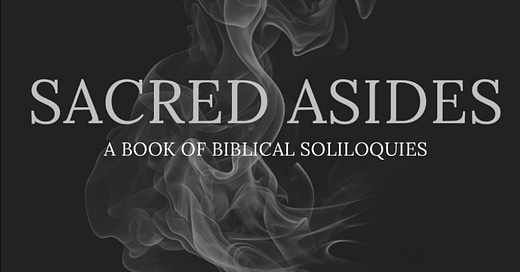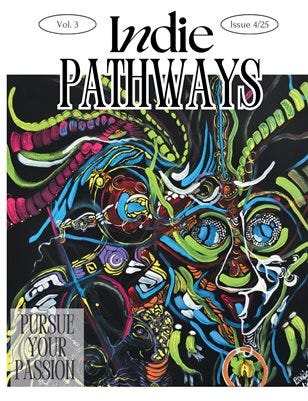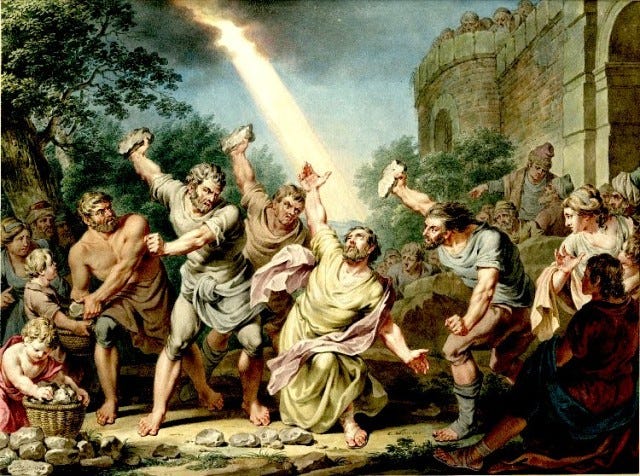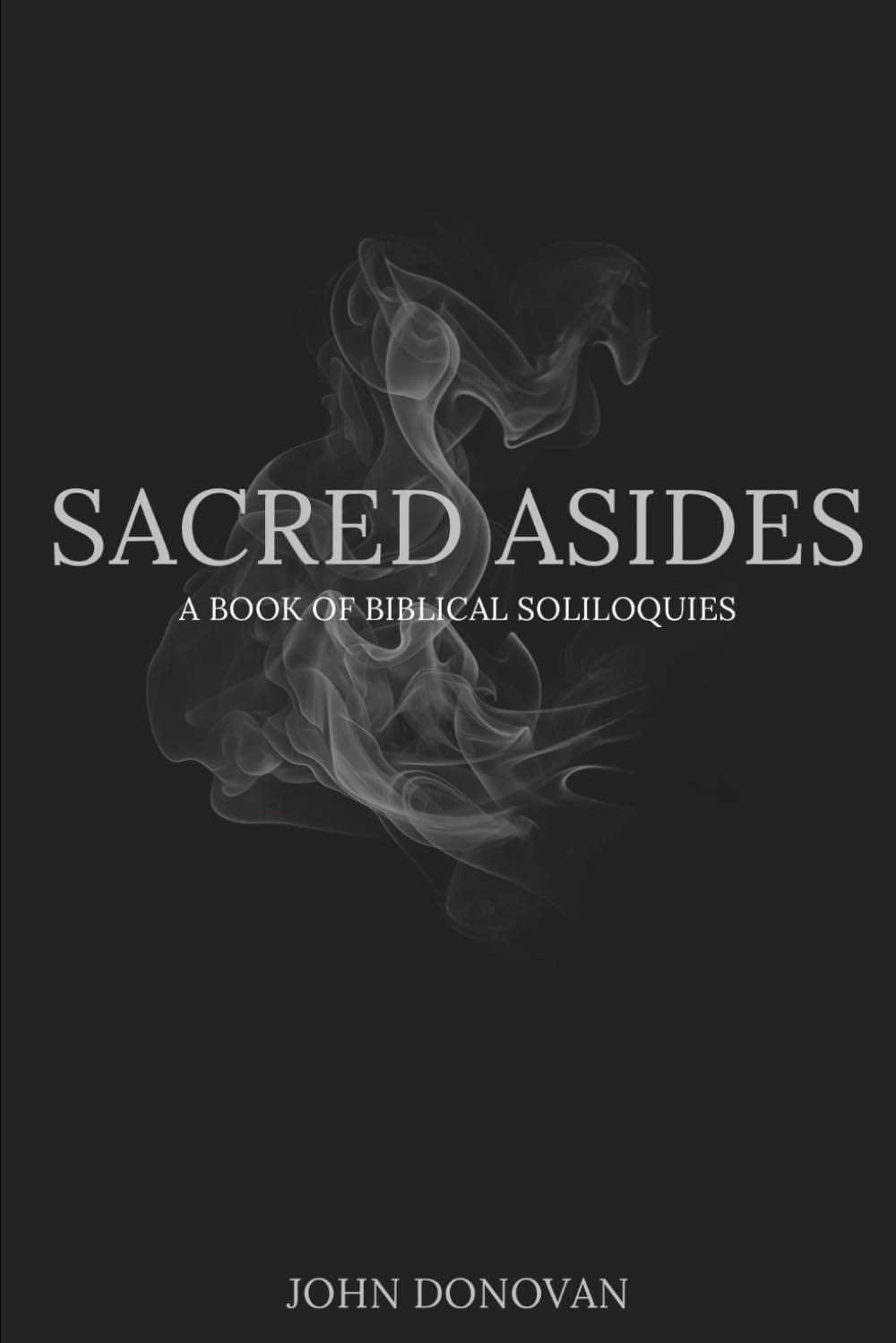Really quickly before today’s poem:
Head to Indie Pathways Magazine to buy their April edition, where my short story, “Damned!” is featured.
Have trouble reading poetry?
It’s meant to be read aloud!
Click below to listen along as you read.
Introduction
This poem picks up after Saul’s encounter with Jesus on the road to Damascus. Saul has been blind for three days, and has not eaten in that time. Ananias wrestles with forgiving someone who has not harmed him personally, but has harmed other people he cares about: the other members of the Body of Christ. Being of one body with them actually does make Saul’s sin against Ananias personal as well.
The other members of the body, like Ananias are “Followers of the Way,” which is how early Christians referred to themselves, from John 14:6, “I am the way and the truth and the life.” The title also suggests what Jesus said in Matthew 7:14, “How narrow the gate and constricted the road that leads to life.” Perhaps one reason it is such a difficult way is that mercy is an unpopular virtue, especially for one’s enemies.
One death that is particularly difficult for Ananias to forgive is that of Stephen, the Church’s first martyr. In the Acts of the Apostles Ananias does not struggle this much. He voices his apprehension to God when he is called, not understanding why he’d be sent to a known persecutor of Christians. But once given the command, he does as he is asked.
In this poem Ananias has a more difficult time between his will which is set on God’s command, and his emotions that try to pull him away. He is tempted to carry out justice, not mercy. He feels he is betraying his fellow Christians by forgiving the one who persecuted them. He frequently reminds himself, though, that Jesus’ words were clear about forgiveness: he can’t justify his way out of it.
Once with Saul, Ananias says things he knows are true, but still struggles to feel or believe: that Saul and he are brothers, and he has been sent to heal and baptize Saul.
To help Ananias overcome his struggle to forgive Saul, Stephen is sent down from Heaven. He tells Ananias that Ananias spoke truly when he earlier called Saul his brother: they are brothers in mutual sinfulness. Stephen refers to Saul as his killer, even though the killers of Stephen only laid down their tunics at Saul’s feet. Suffice it to say, Saul wasn’t the only one to kill Stephen, and may not have even thrown a stone, but he can be held at least partially responsible.
Though Saul was a killer, through Paul many will be won for Christ. If Ananias does not forgive him, they will not hear the message through Paul, and so his failure to forgive will outweigh the murders on Saul’s hands. This act of forgiveness is one of the most important events to occur in the entire course of human history because of who Saul will become.
Ananias’ heart is softened and he forgives Saul, baptizing him and embracing him as a brother. The world is never the same.
Ananias struggles to follow God’s command to forgive and baptize Saul, a known prosecutor of Christians. He finds the man but experiences a gap between what he believes and how he feels. To strengthen him, the martyr Stephen is sent from Heaven. It works and Ananias forgives, then baptizes, Paul.
Acts of the Apostles 9:10-19
Midwifery is not for me. This birth
Already hath it’s bloody share, and that
Of mine own kin! Must I my brothers’ own
Dark slaughterer now spare?
But said the Lord
In no more plainly words, forgive the ones
Who doth pluck beard and beat you all the while.
No argument to that: it is but straight
And true. Still, likest me not this command,
Less popular with kin and kind am I
When mercy’s road I’d walk. But ‘tis the Way.
How is it mine to spare the man, the beast,
Who killed Stephen? Could I his sin pardon
When he sinned not toward me? Now in this house,
He’s blind and weakened more! Could not I raise
God’s red right hand and justice mete in full?
And vengeance dole for those I love, upon
Whom full sin fell? Can I them love were it
To pass that I their killer loved? Cast off
From company! With harsh mercy doth not
A traitor to the trespassed I become?
Against not body’s whole must one lone part
Rebel!
But then again, thus said the Lord
In no more plainly words, forgive the ones,
Forgive them all, when reason most ye have.
Then to the house where Judas dwelt, he led
Me to the thing. “He hath not ate or drank
But pray’rful three days spent.” informed Judas,
Then shrunk back from the sight: a ghastly form,
With sallow cheeks had turned to gaze at us.
But no! Not gaze, for o’er his eyes- but no,
Not o’er- in place of eyes, the serpent’s hide
That eyeless could not form the tears to weep.
In twice-horror I coiled back: which more
I feared, the man or eyes I knew not then,
But dreaded much to stay on Straight.
“Art thou
The one whom Christ did promise me?” He groped
Aloft with hands and soul. He wretchéd reached
To me.
Rebelling all my spirit then
Against my body’s course, I reached then back,
His hands in mine, and spoke, “My brother Saul-”
I knew this true but verity reviled,
Still held to straight command, so said then more
“The Lord to you sent me. The Lord Jesus,
Whomst you did see upon the rocky way.”
He yelled aloud at God’s Son’s name. In pain
Or yearning cried?
“Oh mercy, Lord, who late
I’ve known! In guilt I was conceived and by
The law that stain I sought reprieve. But heaped
Hot coals upon my head through law of sin
And death! Then death I spread to keep the law!
Deserveth I mine end: it’s right and just.”
Then sawest I a holy sight, the sky
It’s treasures showed: my Lord upon his throne,
An emissary sent. The young Stephen
Spoke thus “Your brother true, my killer is:
Refuse mercy and you his soul stamp out.
More grievous still your sin than his if you
Withhold this grace, for through this man the world
Its soul will learn the straight and narrow way.
A hard heart keep and doom them all, a heart
Unsoft kills more than bloody hands. What’s more,
Good Ananias, see his eyes which see
Far more than you. You’re serpent-blind e’en though
You see: the scales obscuring your vision
Are harder far to lose. But hear me now,
Mistake me not: redeeméd as you are,
The old man’s gone! But daily make it so:
You have the grace, aligneth now your will
Surrendering to holy will, which here
And always to great mercy leans. I sewed
The seed of faith in him, now water it,
And heal his eyes’ ailment; thus washing too
His high-fate soul, and bring him to the Way.
I him forgive, who blissward sent me on.
Now do you too, our Lord was plain and clear.”
His words disturbed me not, but softly light
Filled me. Renewed and purpose-firmed upon
His eyes I touched: “The Lord Jesus whom thou
Hast seen upon the way which thou didst come
To thee sent me, that thou might gain anew
Your sight and Holy Spirit brimming filled.”
De-dragoned then, the scales fell off, and I
Then through my brother’s eyes beheld his soul,
As water washed the abnormal babe clean.
Today’s poem comes from my new book Sacred Asides, available in paperback and electronically. This edition features copious annotations that will assist in your understanding of the text. I also offer a cheaper version of the book, which features only the introductions and poems, no annotations, in paperback and electronically.
Get your copy today and thanks for your support. Please share with friends and family who you know would get a lot from this book.








